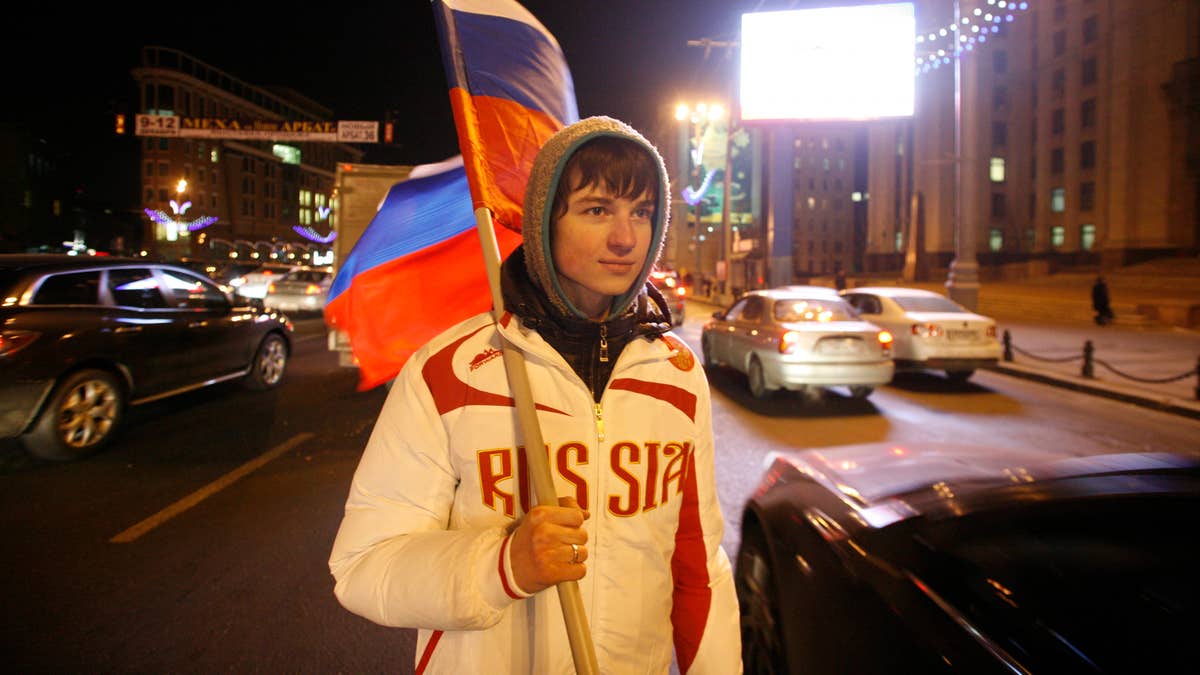
Dec. 2: A young man holding a Russian flag hands out free national flags to motorists in downtown Moscow to celebrate FIFA's selection of Russia as host to the 2018 World Cup. (AP)
MOSCOW – By leading the charge that won the 2018 World Cup, Prime Minister Vladimir Putin cooly reinforced his image as Russia's man of power, bolstering his ability to one day return to his country's most powerful position.
His nominal partner, president Dmitry Medvedev, appeared to be a benchwarmer at best and increasingly unlikely to muster the vim to run in presidential elections less than 1½ years away.
The Thursday announcement that Russia will hold soccer's biggest event was a stunning victory, swelling chests already full of national pride over winning the right to have the 2014 Winter Olympics and bolstering Russians' belief that their nation is the world's greatest sports power.
Russia may not have been able to get a team into the World Cup since 2002 and the country's dismal performance in the Vancouver Olympics was a national scandal — but the country lately has been second to none in bringing events to its sprawling expanses.
Putin has been in the center of both efforts. His appearance before the International Olympic Committee in 2007 when still president was seen by many as the watershed moment in Russia winning the 2014 host contest. His demeanor of steely competence — augmented by his efforts to learn English to give the speech — helped overcome doubts about a country infamous for shoddy construction, endemic corruption, inadequate hotels and truculent bureaucrats.
For the World Cup, he pulled what may have been a clever fake. He was expected to go to Zurich to make the bid presentation, but pulled back from the plan at the last moment. That led to speculation he'd been told Russia didn't have the votes and that Putin didn't want to expose himself as a loser. But it may also have been a careful calculation, to avoid the perception that all Russia had to offer was his charisma.
When the vote came, Putin was ready to rush to the airport, head to FIFA headquarters and to ensure he got plenty of media coverage.
Medvedev, meanwhile, was barely visible throughout the bid process and after the vote was announced, his response was a Twitter post: "''Hurrah! Victory! We're hosting the 2018 championship!"
The responses distilled both men's public personas: Putin, the man of action; Medvedev, the well-meaning but essentially powerless man of mild words.
Medvedev and Putin have run the country since 2008 in an uneasy tandem. Putin's eight years as president left him wildly popular, but he couldn't run again because of term limits. So he hand-picked Medvedev as his successor candidate and then moved to the premiership, theoretically Russia's second-in-command.
But Putin is widely perceived as still the true lever of power in Russia. Medvedev makes statements about reform and democracy, but takes little visible action.
Now that Putin has been out of the presidency for a term, he can run again in 2012 — and if he does, victory would be only a hypothetical question.
Putin didn't need the World Cup to make him everybody's frontrunner. But Medvedev, if he has any ambitions to stay in office, didn't need this reminder to Russians that Putin moves the ball down the field while Medvedev looks on admiringly but diffidently.
